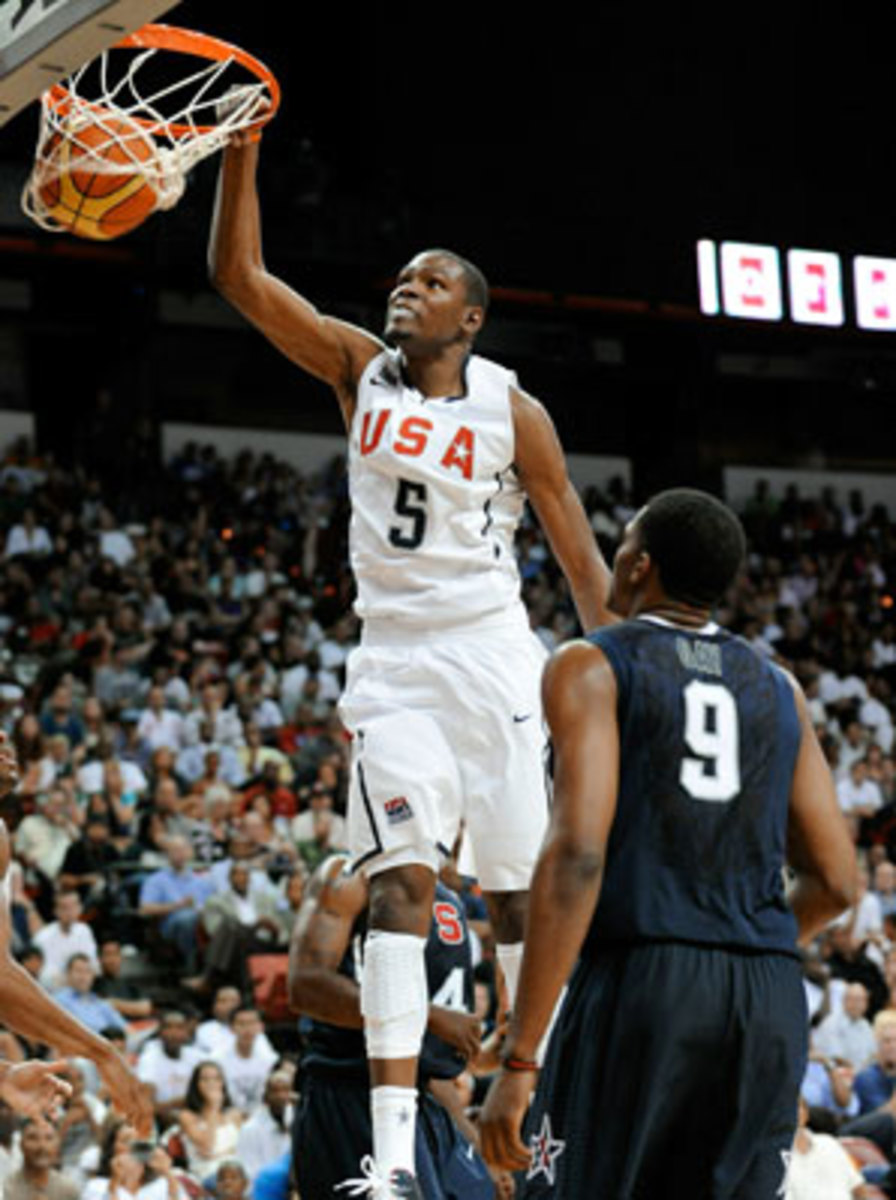
Five questions for Team USA
Ask any USA official about the team's stop concern and each will give you the same answer: shooting. The Americans can expect to see a steady diet of zone defenses, with international teams prepared to dare the U.S. to beat them from the outside. And while Team USA has plenty of players who can make shots (Kevin Durant, ChaunceyBillups, Rudy Gay), it has only two pure shooters (Stephen Curry, whois day-to-day with an ankle sprain,and Eric Gordon) and it's likely that just one of them will be on the final roster. If the perimeter players can prove to be a threat from behind the three-point line, it will open up the paint for a core of athletic slashers. If they don't, those misses will lead to long rebounds and transition threes -- a favorite shot among international teams -- on the other end.
The U.S. coaches are convinced that they will be able to create more offensive possessions by deploying a full-court press. With Russell Westbrook, Derrick Rose and Andre Iguodala, Team USA is loaded with long, physical athletes with the skills to wreak havoc in the backcourt. International teams, however, aren't easily rattled, and if the press fails, the U.S. could run into trouble defending in the halfcourt. The man-to-man defense is suspect -- the Select team, made up of college players, tore it apart during scrimmages in Las Vegas and New York -- and the zone defense JimBoeheim has tried to implement is a work in progress, particularly for the guards, who have struggled defending the three-point shot.
If shooting is worry No. 1 for the U.S., rebounding is worry No. 1A. The loss of Amar'e Stoudemire (insurance issues), Brook Lopez, Robin Lopez and David Lee (injuries) has left Team USA paper thin in the frontcourt: TysonChandler is the lone true center, and Lamar Odom and Kevin Love are the only natural power forwards. With coach Mike Krzyzewski preaching a gang rebounding mentality, the pressure will be on Durant, Iguodala, Gay and Danny Granger to help out on the glass.
Durant has dodged questions about his role, but U.S. coaches have acknowledged that for this team to win, the Oklahoma City Thunder star will have to dominate. The NBA's reigning scoring champ needs to be a scorer, rebounder and facilitator as well as a vocal leader on an inexperienced roster. The pressure will be on, too. Anything short of a gold medal means the U.S. will have to qualify for the Olympics next summer, when the entire roster could be detonated if the NBA is involved in a work stoppage.
Greece, which defeated the U.S. in the semifinals of the 2006 World Championship, remains strong. The Greeks run a lot of misdirection to create mismatches for Sofoklis Schortsanitis, a 6-foot-9, 344-pound power player with soft hands and a deft touch around the rim. They also have DimitrisDiamantidis, a 6-6 playmaker who excels at the drive-and-kick. Spain won't have Pau Gasol, but it still has his younger brother, Marc, as well as Ricky Rubio, Rudy Fernandez and Juan Carlos Navarro, who will run the U.S. ragged off screens. Brazil, which boasts NBA players Leandro Barbosa, Anderson Varejao, Nene and the Spurs' latest addition, Tiago Splitter, runs a fluid motion offense that plays off reads. Argentina, Turkey and Lithuania are experienced teams with NBA talent.




